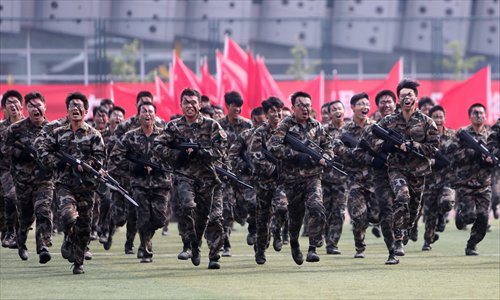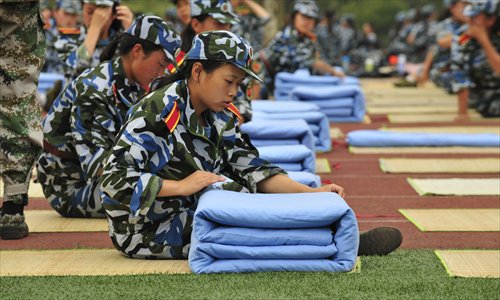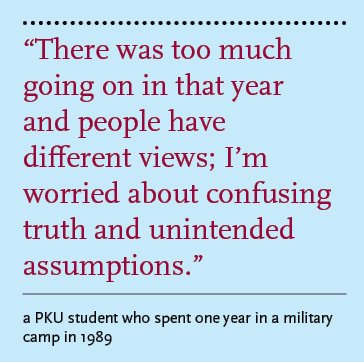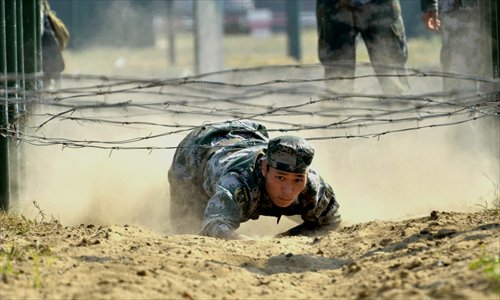After 1989, students had to spend 1 year in military camps, now such training is business
China has imposed military training on all college students since 1989 in a bid to ensure that the elites of the future absorb official ideology. Even to this day it remains a touchy topic for those who spent a year in military camps during the early 1990s, a period marked by political confusion. Some agreed to talk under pseudonyms and from their accounts we can have a glimpse of their rite of passage that shaped a generation.

Shandong University freshmen perform military drills in camouflage during a military training parade on September 25, 2015 in Jinan, Shandong Province. Photo: CFP
After staging an angry protest that cut short their military training, some of the students of Beijing City University went to coastal Qingdao on a triumphal vacation, celebrating their successful rebellion against what they said was brutal enslavement - the compulsory military training that all Chinese college students face.
Earlier this month, the millennials used social media to complain about the rite of passage: marching in sizzling temperatures; over 300 people showering together in only 10 to 20 minutes; no AC in the dormitories; their cellphones being taken away by officers and other examples of the discipline and discomfort of army life.
Their plight may sound severe, but it pales in comparison with what students experienced more than 20 years ago.
Military training, also known by its full name "military and political training for college students," was made compulsory for every university student in the fall of 1989 following political turmoil in which academics played a big part.
Students enrolled at the prestigious Peking University (PKU), a bastion of political movements in China's modern history, between the fall of 1989 to 1992 were required to spend a year in military camps before they started their full-time academic studies. Fudan University in Shanghai imposed the same rule from 1990 to 1992.
The goal, apparently, was to instill patriotism and loyalty into the cream of the crop, who after the turmoil were viewed with some suspicion as potential sources of instability.
"The military training has lost its meaning, and I don't think it's relevant to this era," said Zhao Junming (pseudonym), an employee of a State-owned conglomerate who went to PKU in 1992 and was among the last group of students to spend a year in military camps.
In explaining why he believes there is no longer need for campus military training, Zhao claimed that the whole society, including elites in their ivory towers, have today embraced the supreme ideal of material gains wholeheartedly and are too busy for anything else.
Back in 1992, when Zhao was dispatched to a military camp in Xinyang, Central China's Henan Province after being admitted to PKU, cultivating the minds of university students was high on the country's political agenda. Even though years had passed after the political turmoil and no one had mentioned the incident in public since, students were still talking about it.
Zhao, from a rural part of an inland province, said he was overwhelmed by the deluge of information shared by students from Beijing who still had fresh memories of what happened. Zhao's family did not have a TV and in fact, his village was not connected to the power grid until 1996. When a curfew was imposed at night in the camp, Zhao and dozens of his fellow students would talk endlessly in their dormitories. Exhaustion from the day's intense drills failed to prevent them from debating state affairs.
Zhao had mixed feelings about the one-year military training, which had made it easier to get into PKU and Fudan. Some top high school graduates chose to apply for other elite universities that required only a month of military training. It was a big news in his home county when Zhao was admitted to PKU.
The military training was comprised of three parts: 30 percent academic studies, 30 percent military training and 40 percent political training. Zhao said he is still grateful to have received the political courses.
The curriculum sounded boring at first - national defense education, socialism construction, revolutionary history and other dry topics.
"But in fact, the lectures laid the theoretical foundations and framework for my way of thinking," said Zhao, still in awe 24 years later.
For a country boy who had excelled in memorizing textbooks, the political courses gave Zhao his first real taste of philosophy. Zhao attributes his liberal leanings to the year of political education that trained him "to think about things other than survival and mere existence." It is a bit ironic, he admitted.

Hundreds of Qufu Normal University freshmen exhibit their blanket folding skills on the college's sports ground on September 24, 2015 in Rizhao, Shandong. Photo: CFP
The gaze of top leaders
For Wang Xiangkun (pseudonym), admitted to PKU in 1989, his year in the military camp kicked off with confusion. The fall semester began late that year because of the aftermath of the political chaos. Some of his fellow freshmen went to their campus in Beijing to get registered, only to be told they should immediately go to a military academy in Shijiazhuang, about 300 kilometers southwest of Beijing in Hebei Province.
Wang recalled that at the end of 1989 an official gave them a lecture about the collapse of Eastern European states and elaborated on what lessons should be drawn from it. "My view of the world was in a state of flux and I was more confused than shocked at that time," said Wang, a Beijing native who is now employed by a multinational corporation.
Some of Wang's peers worked hard on their English and cared about nothing else. It worked. When they finished their military training, their English skills were good enough for them to study abroad. Some others joined the Party when they visited Xibaipo, a village where the Communist Party of China (CPC) held a landmark conference in 1949. "I think they were the real believers," Wang said.
The students were confined to the military compound and only on Sunday could some of them venture out as there was a limit on how many could leave at one time. Time, which seemed to be passing so slowly because of the monotony of camp life, had become a heavy burden. Like other students, Wang kept writing letters to his parents, friends and old school buddies to vent his boredom and frustration. "Sometimes I wrote three letters in a breath and expected my friends to write back and tell me what their campus life was like."
In May of 1990, eight months into the military training, Wang had some idea about what life in his university was like. He and his fellow students were called back to PKU to march in formation for the opening ceremony of a collegiate sports meet at which they did their best impression of a goosestep.
They stayed for two days on campus, but it hurt to be there.
In military camps, the students were made to march to the cafeteria before each meal. They did the same thing on the PKU campus when they went to lunch. The sophomores, who had not gone through one-year military training, looked in dismay at them walking in step. "They laughed loud at us and tapped on their bowls with their chopsticks, as if to say 'you are not us!'"
At night, older students went outside the building in which they were temporarily staying and sang love songs for the freshman girls, a PKU tradition to welcome newbies. They had an extensive repertoire of pop songs unknown to Wang, who learned only military songs in the camps.
"At that time, the girls of our year were all weather-beaten from the military training, we recognized their beauty only after we officially moved to campus," Wang coyly added.
Wang could always sense a rift between students of his year and the older ones. "In their eyes, we were a different species because of our military training and they were the authentic PKUers who carried the tradition of liberty," Wang said, "It took quite some time for them to accept us and for us to adapt as well."
The rift still lingers on in today's Chinese society, Wang added, though he declined to elaborate.
In the camps, there was no rift but unison. Disparities between rural and urban students and between different social classes seemed to vanish. "Dragons, phoenixes and small potatoes mingled together in the camps," Zhao recalled. They all wore the same uniforms, ate the same food, sang the same revolutionary songs before each meal, and took showers together with dozens of others. When they took a shower, they had to scrub each other's backs with towels to get the dirt off because a shower was a rare treat.
The military training is supposed to make you forget you are an individual and realize you're all just parts of a machine, and when the machine moves, all of the parts should move together, Zhao said, "It's all about conformity."
The training was highly political at that time, especially for PKU students, who were given special care and attention from top leaders. In the summer of 1990 when 728 PKU freshmen were about to finish their one-year training in a PLA academy in Shijiazhuang, Song Ping, then member of the Standing Committee of the Political Bureau of the CPC Central Committee, and Li Tieying, then member of the Political Bureau, went to inspect them.
Under the gaze of the top leaders, the students goosestepped in formation, guns in hand. "We knew we were expected to serve as a force of change and to bring discipline to PKU and transform it," said Wang.
In an online article dated in 2014, an author using the penname "shinian kanchai," recalled his military training as a freshman of Lanzhou University in 1990. In his account, students' surging libidos were palpable with vivid descriptions of how a buxom female student was made to march under the scorching sun, breasts "bouncing like two rabbits" in her uniform soaked with sweat, and how the male students held a grudge against the PLA training officer who ordered her to walk.
It was an interesting read, full of fun anecdotes. There are many articles online talking about how the military training in those days helped cultivate strong will and perseverance.
It was all real, but the state of euphoria described in these articles that skip over the pain and despair might be the result of self-delusion according to Zhao. "We subconsciously choose to forget unhappy things to make ourselves happy, and to convince ourselves that our life wasn't wasted."
"Life was never wasted," Wang disagreed, "the strong ones give meaning to it when there didn't seem to be any." Wang said he has always wanted to write about his military training but one thing holds him back - "there was too much going on in that year and people have different views; I'm worried about confusing truth and unintended assumptions."
After all it is still a touchy topic for most people. Several former PKU and Fudan students declined interview requests from the Global Times reporter, citing the sensitivity of the matter.

Now you pay
To Zhao, everything changed in 1992 when Deng Xiaoping, chief designer of China's reform and opening-up, made his famous tour of southern China and announced that economic development is the nation's central task and "planning and market forces are not essential difference between socialism and capitalism."
Deng's speech marked a watershed moment for China. From then on the nation vowed to make a departure from the confusion of 1989 and set their minds to getting rich in whatever fashion. Deng's tour and speech in 1992 was more powerful than any military training in shaping the students' minds, Zhao said.
"Posters of business incubator seminars are everywhere on campus now," Zhao added, "We might have been the last bunch of students who would argue about Kant and Sartre."
The military training, which used to be intrinsically political, has itself evolved into a business.
Most military training has been taken over by agencies that hire retired soldiers, according to a military officer who used to be in charge of college students' military training. At Beijing City University where the students protested against military training this month, each student paid 600 yuan ($90) for six days. To maximize their revenue, the agency took more students than they could realistically accommodate, triggering the protests.
"The agencies are commercial institutions and are paid to train those students," said the officer who wishes to be kept anonymous, "but years ago, when we were training the students, we were not paid; it was a political task."
The officer still believes military training is necessary for China's college students, since the country has the responsibility to teach the students about "patriotism, discipline and correct values." "We need real men in this country," said the officer, "How can you expect today's weaklings to fight Japan if they invade again?"

A Liaocheng University student crawls under barbed wire during special training activities held for National Day on October 5, 2015 in Liaocheng, Shandong. Photo: CFP
Newspaper headline: Signs of the times